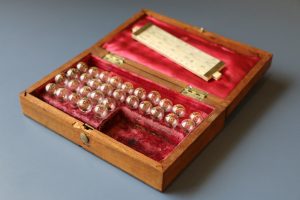On the first day of cataloging the vast array of equipment held in Bicentennial Hall, I came across a small wooden box. Inside the silk lined box are 31 hand blown glass beads with number painted on in gold paint, and a bone slide rule. Engraved on a small ivory plaque on the lid of the box are the words “Lovi Edinr Patentee.” After Wendy informed me that Edinr stands for Edinburgh, I quickly googled to find that they are aerometrical, or specific gravity, beads. Beads such as these, also known as “philosophical beads”, were invented by Alexander Wilson of Glasgow in the 1750s, and were used to determine the specific gravity of a fluid. The user would drop the beads into a liquid until finding the one with neutral buoyancy, which would indicate the specific gravity. By using the slide rule, one could then, for example, find the alcohol content in wine.
lined box are 31 hand blown glass beads with number painted on in gold paint, and a bone slide rule. Engraved on a small ivory plaque on the lid of the box are the words “Lovi Edinr Patentee.” After Wendy informed me that Edinr stands for Edinburgh, I quickly googled to find that they are aerometrical, or specific gravity, beads. Beads such as these, also known as “philosophical beads”, were invented by Alexander Wilson of Glasgow in the 1750s, and were used to determine the specific gravity of a fluid. The user would drop the beads into a liquid until finding the one with neutral buoyancy, which would indicate the specific gravity. By using the slide rule, one could then, for example, find the alcohol content in wine.
These beads turned out to be quite rare. These beads are an improved version, patented by Isabella Lovi in 1805. They presumably were handmade by Lovi, with only four, now five, known sets in existence. After further digging, we discovered that these beads were likely purchased by Professor Hall in 1809 during his trip in Europe, and were used in his lectures at Middlebury, as referenced by student Jonas Colburn in his 1815 notes. We are currently contacting the National Museum of Scotland, which owns other known sets, for more information.
-Mike & Wendy
What a great find! Please keep us updated with when you hear from Scotland.
Love this and yes please keep us posted!